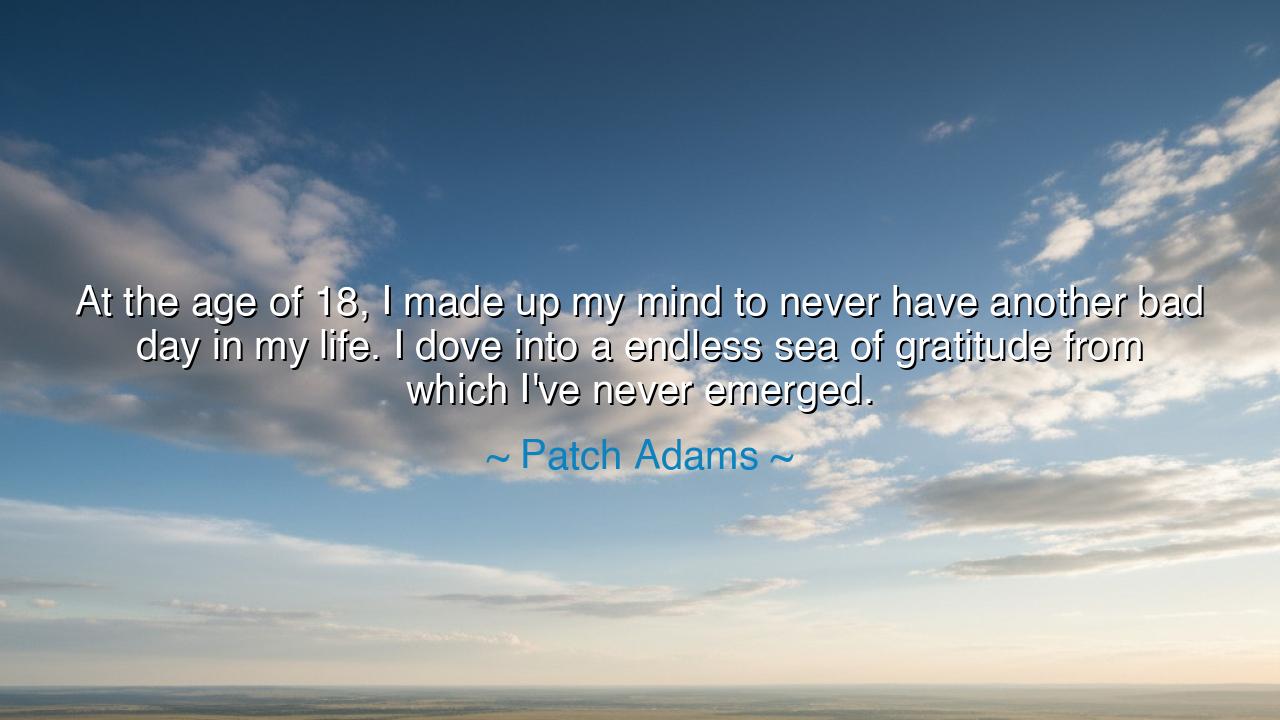
At the age of 18, I made up my mind to never have another bad day
At the age of 18, I made up my mind to never have another bad day in my life. I dove into a endless sea of gratitude from which I've never emerged.






"At the age of 18, I made up my mind to never have another bad day in my life. I dove into an endless sea of gratitude from which I've never emerged." — thus declared Patch Adams, the healer of hearts and the doctor of laughter, whose very name has come to symbolize joy in the face of sorrow. His words shine with the light of a soul that has walked through darkness and chosen love over despair. They speak not of denial, but of transformation — of a deliberate turning of the mind from bitterness to gratitude, from complaint to wonder. In that single decision at eighteen, Adams discovered a truth known to the wise of every age: that happiness is not a gift bestowed by fate, but a discipline of the spirit.
In the manner of the ancients, one might say: the soul that gives thanks is unconquerable, for no storm can drown it. Patch Adams, born Hunter Doherty Adams, was not always the joyful figure the world came to know. In his youth, he wrestled with depression, even to the brink of suicide. But out of that abyss came his vow — that he would never again let despair master him. From that moment, he became a student of joy, a warrior of compassion, and a physician who healed not only with medicine, but with laughter, kindness, and play. His "endless sea of gratitude" was no mere poetic fancy; it was the ocean in which he chose to live his days, a vast and unending current of appreciation that carried him through all suffering.
To understand his wisdom is to see that gratitude is not the denial of pain, but its transmutation. The grateful heart does not pretend that life is without struggle; rather, it finds meaning even in struggle. Where others see burden, gratitude sees blessing; where others see failure, it sees learning. In choosing gratitude as his constant state, Adams made himself invulnerable to bitterness. For though sorrow may visit the grateful man, it cannot dwell within him — his heart is already filled. The “endless sea” he speaks of is the state of a mind that refuses to be small, that expands beyond the boundaries of fear, embracing all of life — its sorrow and its song alike.
Consider the story of Viktor Frankl, the Jewish psychiatrist who survived the Nazi concentration camps. Stripped of everything — family, freedom, and dignity — he still found one thing no cruelty could take from him: the freedom to choose his attitude. In his suffering, he discovered meaning, and in meaning, strength. Like Patch Adams, he proved that the human spirit can endure any hardship if it learns to say, even in pain, “thank you for life.” Both men, though shaped by very different worlds, shared the same secret — that gratitude transforms suffering into wisdom, and despair into purpose.
The decision Adams made at eighteen is the decision each of us must make, though few do. It is the conscious act of refusing to be ruled by circumstance. Life will bring injustice, loss, and heartbreak — that is certain. But gratitude is a power greater than circumstance, because it changes the soul, not the situation. It teaches us that every breath is a gift, every failure a lesson, every dawn a renewal. To live in gratitude is to live awake, to see the miracle in the mundane and the divine in the everyday.
The lesson, therefore, is both simple and profound: if you wish to live without “bad days,” you must learn to live with grateful eyes. Begin each morning not with worry, but with thanks. Thank the air for entering your lungs, the people who cross your path, even the obstacles that shape your strength. When hardship comes, look for what it teaches you rather than what it takes from you. Gratitude is not the denial of pain, but the choosing of perspective — the way the mind turns shadows into light.
And so, my child, remember the vow of Patch Adams — that life’s quality depends not on what befalls you, but on what you behold. Dive, as he did, into that endless sea of gratitude, and never seek to emerge. Let every breath be a hymn, every moment a prayer of thanks. For when you live in such a way, no day can be truly bad — for each is redeemed by wonder. In the heart that gives thanks, age cannot weary, sorrow cannot linger, and even death cannot conquer — for that heart has already found the secret of eternal joy.






AAdministratorAdministrator
Welcome, honored guests. Please leave a comment, we will respond soon